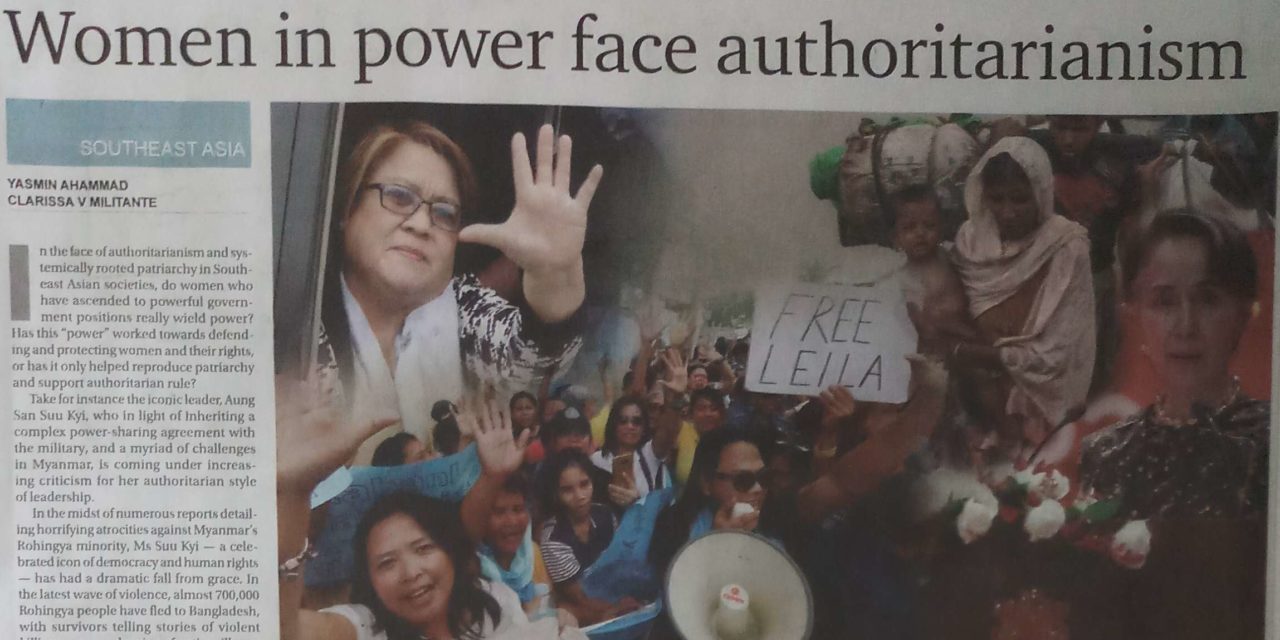In the face of authoritarianism and systemically-rooted patriarchy in Southeast Asian societies, do women who have ascended to powerful government positions really wield power? Has this ‘power’ worked towards defending and protecting women and their rights, or has it only helped reproduce patriarchy and support authoritarian rule?
Take for instance the iconic leader, Aung San Suu Kyi, who in light of inheriting a complex power-sharing agreement with the military, and a myriad of challenges in Myanmar, is coming under increasing criticism for her authoritarian style of leadership.
In the midst of numerous reports detailing horrifying atrocities against Myanmar’s Rohingya minority, Aung San Suu Kyi—a celebrated icon of democracy and human rights—has had a dramatic fall from grace. In the latest wave of violence, almost 700,000 Rohingya people have fled to Bangladesh, with survivors telling stories of violent killings, rape, and razing of entire villages. Meanwhile Aung San Suu Kyi appears defiant in her refusal to address these human rights violations head on.
While Aung San Suu Kyi’s perceived silence and complicity in the Rohingya crisis has provoked widespread international condemnation, her behaviour is also not entirely surprising given the legacy of patriarchy and authoritarianism she has inherited and continues to be part of. The complex reality of asserting power in Myanmar leaves little room for virtue.
As the daughter the Founder of the Nation, Aung San, she is both empowered and burdened by her father’s legacy to unify a country split along ethnic and religious lines. This legacy brought her widespread support amongst the numerous ethnic groups, but the peace process has stalled, while conflict in Kachin and Shan state has intensified. Ethnic minorities are increasingly losing faith in Aung San Suu Kyi – a seemingly out-of-touch representative of the Bamar ethnic majority and political elite, ruling from an ivory tower.
In relation to the Rohingya crisis, the situation that has brought her the most criticism from the international community, she has been accused of maintaining silence. Desmond Tutu, a fellow Nobel laureate, expressed a common view in stating: “If the political price of your ascension to the highest office in Myanmar is your silence, the price is surely too steep.” Yet Aung San Suu Kyi has not remained silent. Rather she is making an active, tactical decision to not criticize the Tatmadaw.
Her responses to the crisis have ranged from bland platitudes about the rule of law, to outright untruths, dismissals, and obfuscation of reports of widespread human rights violations.
As a venerated human rights icon, we expect Aung San Suu Kyi to condemn the ethnic cleansing of Rohingya. As a woman leader, these expectations are augmented; we project saintly qualities onto her, and hope for her to speak out on women’s rights, especially in light of horrifying stories of sexual violence against Rohingya women and girls.
Yet Aung San Suu Kyi will continue to fail meeting our expectations against this complicated reality in which she is acting as a politician within the confines of a deeply patriarchal regime that retains authoritarian tendencies.
Recognizing these complexities, limitations, and challenges doesn’t mean we should stop demanding more from Aung San Suu Kyi, or hold her accountable. But it does mean we stop idealising her as a saintly icon she could never live up to.
Conforming to Myanmar’s political culture
Aung San Suu Kyi’s leadership style follows established practice in a country in which the political culture has largely been dominated by men, and characterized by top-down, hierarchical decision making. But she is accused of centralizing governance even further, and closing herself off from everyone but her closest advisors. She maintains a keen distance from the media, as well as civil society groups, the same allies who spent years calling for her freedom.
Her ascent to power has been dogged by the 2008 Constitution, instituted by the military, which guarantees them a quarter of seats in parliament, as well as control over three key ministries—Home Affairs, Border Affairs, and Defence. The same constitution prevents Aung San Suu Kyi from holding the presidency. Likely drafted by the military with her in mind, the constitution bars presidents from having a spouse or children who hold foreign citizenship.
Given this barrier to leadership, Aung San Suu Kyi herself has exuded similarly authoritarian qualities in her consolidation and exercise of power. She has given herself the position of State Counsellor, claiming herself to be “above the President” and de-facto ruler of Myanmar, where she will “make all the decisions,” thanks to the cooperation of her President of choice, Htin Kyaw, a close friend and confidant.
Her mission to maintain her grip on power has meant reaching significant concessions with a rampant military, and curtailing freedom of expression. The number of political prisoners—although significantly fewer than under the previous government—still number almost 50, while defamation cases have soared under the NLD with the use of section 66(d) of the 2013 Telecommunications Law.
While Aung San Suu Kyi’s leadership represents a significant change in Myanmar’s political development, hopes that she can overcome its authoritarian nature have been significantly curtailed.
The Philippine president’s ‘quarrel’ with women
In Myanmar, a woman in power has become a means to reproduce patriarchy, meanwhile in the Philippines women government leaders fight for whatever space they still have as they try to survive and fight a misogynist head of state.
Apart from the victims of Duterte’s war on drugs or tokhang (knock and then shoot), it was clear early on in his presidency that he was also targeting women in powerful government positions critical of him or his government. (This, on top of denigrating women in general and inciting violence against them through his misogynist remarks passed on as jokes)
The first to suffer from Duterte’s own brand of authoritarianism was neophyte senator and former justice secretary under the Aquino government, Leila de Lima.
Duterte had accused De Lima of drug trafficking, heading a ring of traffickers imprisoned in the country’s main prison in Muntinglupa, south of Manila; and that she had also received drug money for her senatorial campaign. Testimonies from several prisoners were heard during a congressional hearing initiated by the president’s allies on the case of De Lima. Before this, the senator, as head of the Senate justice and human rights committee, was already conducting public hearings on alleged extrajudicial killings under the president’s war on drugs. The conflict between De Lima and Duterte is being traced back to when the latter was still mayor of Davao City, year 2009, and then as chair of the Commission on Human Rights, De Lima initiated an investigation of the mayor’s involvement in the Davao death squads.
In February this year, the Senate ethics committee dropped charges against De Lima, and the Office of the Ombudsman dismissed cases against her of financing terrorism and violation of the anti-graft law. The Office of the Ombudsman head Conchita Carpio Morales was also threatened with impeachment last year by the president for “conspiring to oust me.” Morales wanted to investigate the alleged unexplained wealth of the president.
Meanwhile, Chief Justice Maria Lourdes Sereno, the first female Supreme Court chief justice in the Philippines, is under threat of impeachment in a House of Representatives not only ruled by Duterte’s political allies but with hardly any opposition anymore.
These moves to unseat mostly critical women in high government positions have been further eroding the hard-fought rights of Filipino women to be recognized as having political agency and equal status in running affairs of the state. The Philippines has had two female presidents in the post-Marcos era and in the entire of history of the country—Presidents Corazon Aquino and Gloria Macapagal Arroyo.
The ascendance of these women to the highest position of the land has not necessarily translated into the broadening of Filipino women’s participation in governance, realization of women’s rights, and much less in eliminating—or even weakening—patriarchal values. Corazon Aquino’s government was also marked by human rights violations, particularly against peasants, as she championed elite democracy and the interests of her own class, the landed elite. Macapagal Arroyo’s government is now synonymous with corruption, including alleged corruption that went up to the highest ranks in the military which she had allowed to ensure their loyalty.
Women’s rights advocates have rallied behind De Lima and Sereno, although the two public officials may not always see their situations and struggle as part of the bigger women’s movement.
As the situations in Myanmar and the Philippines show, women in government in the mostly ‘all-boys’ club’ politics of Southeast Asia have a long way to go in overturning patriarchal values, and in championing the rights of all women.
This article was also published in the Bangkok Post on 10 March 2018.









